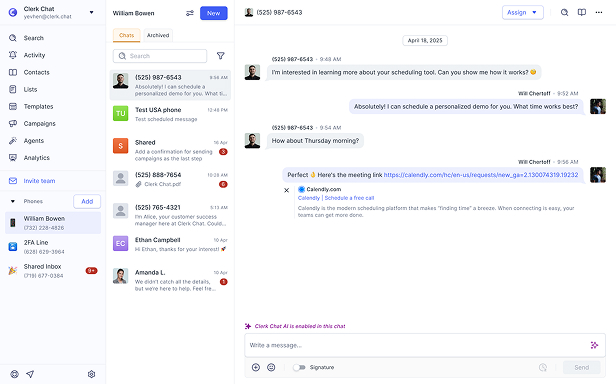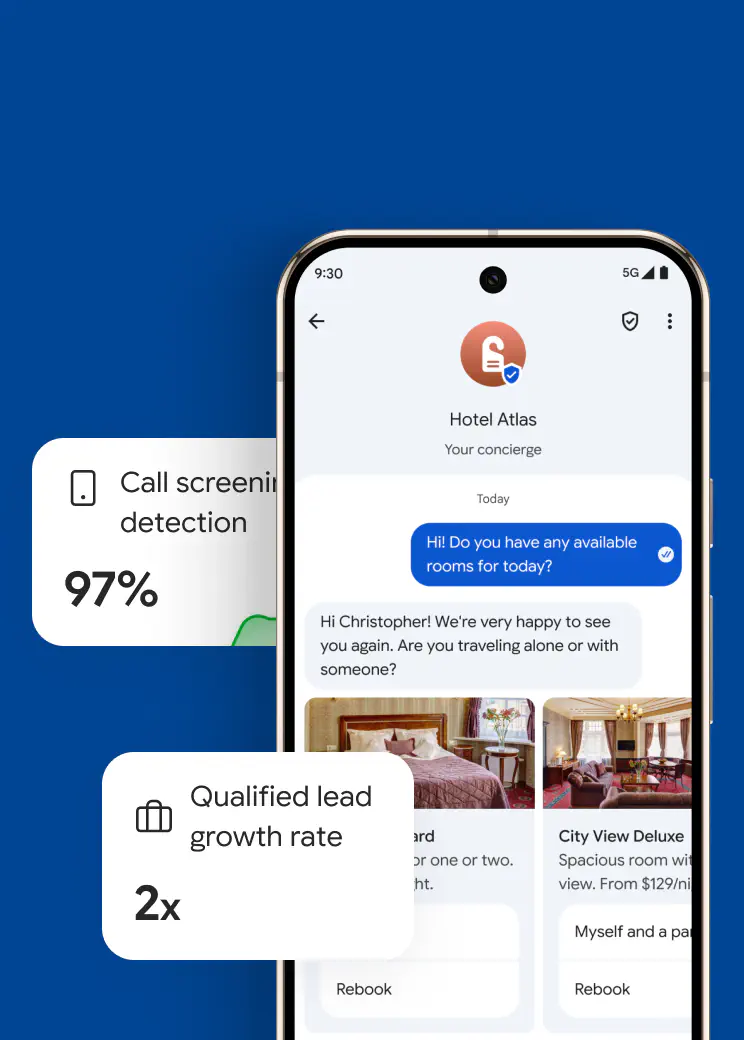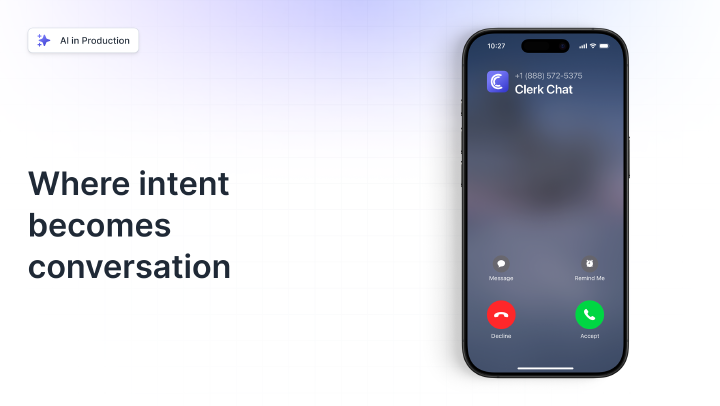Conversational AI for Automotive: Get in the Fast Lane
By William Bowen
- Published: June 19, 2025
Key points in this article:
- Conversational AI is revolutionizing the automotive industry, giving companies new ways to engage, serve, support, and empower drivers.
- Beyond enhancing customer service, conversational AI tools can improve driver safety, enhance sales processes, and boost employee efficiency.
- Companies across the automotive sector are already using conversational AI to improve customer satisfaction and increase revenue.
- In the years ahead, conversational AI’s impact on the automotive industry will continue to grow, with the rise of new integrations, advanced algorithms, and even agentic AI tools.
The automotive industry is evolving fast. World-leading firms are embracing new methods of communication, like automotive text messaging for promotions and customer service.
Some companies are experimenting with concepts like autonomous vehicles, and many are looking into new fuel sources to reduce their carbon footprint. If you’re looking for an intuitive way to stay ahead in this industry, one of the most valuable trends you can explore is the rise of conversational AI for automotive brands.
Although artificial intelligence has influenced automotive organizations for years, helping teams analyze data, enhance supply chains, and even automate assembly floor tasks, conversational AI introduces a new opportunity.
With the right technology, automotive leaders can do much more than just streamline customer service and sales tasks. They can transform marketing efforts, revolutionize team efficiency, and improve driver experiences.
Here’s your guide to the rise of conversational AI in the automotive industry.
In this article:
What is Conversational AI for Automotive Companies?
Understanding conversational AI can be complicated for beginners. It’s not just another term for “chatbots” (you can learn all about the conversational AI vs chatbots debate here).
Conversational AI is the technology that allows computers or machines to understand and respond naturally to human conversations. Tools powered by this technology leverage advanced technologies, like Natural Language Processing (NLP) algorithms, machine learning, and even large language models to interact with human beings.
Conversational AI for automotive companies gives organizations a unique way to enhance various processes. They can provide 24/7 assistance to drivers with customized bots and virtual agents, add unique voice-activated controls to vehicles, and even improve sales strategies with personalized product recommendations.
Evolutions in conversational AI technology, combined with concepts like generative AI and agentic AI, are even leading to the rise of systems that can complete entire processes on behalf of human beings.
For instance, an automotive company looking to boost sales with conversational AI could use a series of agents to qualify leads, craft marketing messages or sales pitches, and send content to customers at specific times, all without human input.
Bring AI into the driver’s seat of your customer experience.
Try Clerk ChatConversational AI Applications in the Automotive Sector
Conversational AI in the automotive industry is compelling because it gives human beings a way to interact with machines like never before.
The most obvious use cases for this technology often fall into the category of “customer service.” For instance, you’ve probably already interacted with AI in customer service apps created by big brands like Ford, Toyota, and BMW.
But the applications of conversational AI go further than you might think. Just some great examples include:
Streamlining Customer Routing
Most automotive companies handle thousands of calls, messages, and customer requests daily. Making sure those queries reach the correct agents or departments immediately is crucial to maintaining operational efficiency and keeping buyers happy.
Conversational AI is brilliant at this task. With conversational AI for automotive contact centers, businesses can immediately qualify queries, identifying customers’ needs and goals based on keywords they type or speak out loud.
Some tools can even authenticate callers based on their voice or ask questions that help them gather data to share with agents before transferring the call to a human being. This leads to much faster issue resolution rates and significantly smaller call queues.
Specific conversational AI platforms can even use data to identify VIP or priority customers, so team members know which queries to prioritize.
Identifying Trends for Data-Driven Decision Making
Another great thing about conversational AI for automotive industry giants is that it makes it easy for companies to sort through and extract insights from vast volumes of data.
For instance, AI-driven tools in customer service can scan through dozens of call recordings and previous conversations, identifying common customer concerns, questions, and pain points. This can help businesses create better customer service strategies and more intuitive buyer self-help resources.
AI solutions can also provide insights into the best time to reach your audience, based on historical data. That means you’ll be able to use your communication and business texting tools to send messages to customers in specific segments when they’re most likely to respond, or complete an action, like clicking on a link.
Some systems can even scan additional information, examining market trends and buying patterns, to help businesses determine which products, features, or capabilities they should invest in based on buyer priorities.
Personalizing Customer Service and Sales
As mentioned above, one of the top benefits of conversational AI for automotive companies is that it can help them to strengthen customer experiences. It doesn’t just give businesses a way to provide their customers 24/7 service (more on that later).
Companies that invest in enhancing customer service with conversational AI can use data to personalize every interaction with a customer. You can train your AI tools to make recommendations and suggestions on products that might appeal to a customer in real time whenever they contact your team through SMS or a chatbot.
Some companies even take advantage of end-to-end conversational marketing strategies powered by AI, which allow them to guide customers through every stage of the purchasing journey - from product discovery, to car customization, sales, and even onboarding.


Scheduling Maintenance Appointments and Reminders
Speaking of supporting customers throughout their purchasing journey, for automotive companies, the relationship with a client doesn’t end after they buy something. Customers expect brands to help them make the most out of their purchase.
Generally, this means helping buyers to maintain their vehicles, or even upgrade them with new features and add-ons as they emerge.
From a maintenance perspective, conversational AI in automotive industry workflows can help organizations identify when specific buyers are most likely to need to schedule an appointment with a mechanic based on data about that customer.
This means companies can automatically use RCS or SMS for messaging strategies, sending customers booking forms they can use to arrange an appointment. After a customer books a maintenance session, the same conversational AI assistant can send reminders leading up to the date, reducing the risk of missed appointments.
For instance, Subaru in Fullerton used conversational AI to improve its appointment show rate by 88% by sending regular reminders to customers.
Enhancing Driver Experiences
One of the most revolutionary use cases of conversational AI for automotive companies is that it can transform the overall driver experience.
Leading brands are beginning to embed AI assistants into vehicles. These tools allow drivers to use voice-activated assistants to make calls, set navigation routes, access vehicle information, and even play music without taking their eyes off the road.
These innovations are improving the safety of drivers and pedestrians worldwide while simultaneously enhancing the overall driving experience for customers. Overall, more than 50% of drivers today say they’d be interested in having an AI-powered assistant in their car, showing just how popular this technology is.
Beyond helping drivers with the basic elements of navigating the roads (and their vehicles), AI assistants can even provide breakdown assistance or troubleshooting support to customers facing real-time issues, helping minimize common roadside issues.
Bring AI into the driver’s seat of your customer experience.
Try Clerk ChatThe Benefits of Conversational AI for Automotive Brands
At this point, the benefits of conversational AI for car dealerships, manufacturers, and drivers might already seem obvious. However, if you’re still wondering how this technology can benefit your business, the three main benefits are:
Improved Customer Experiences
Overall, conversational AI transforms and enhances customer experiences. We’ve already mentioned how an AI-powered SMS solution or chatbot can personalize customer interactions, helping them find the right products and services faster.
These tools can also make it easier for customers to schedule maintenance appointments, learn about new products, and improve their safety on the road.
In addition, AI solutions ensure that automotive companies can provide customers with 24/7, multilingual, always-on support across multiple channels.
For instance, an SMS-based conversational AI bot can answer questions about technical issues, appointments, and even products whenever a customer is available, reducing the strain on human teams and improving customer satisfaction rates.
Enhanced Operational Efficiency
Using conversational AI for automotive industry processes in sales, marketing, and customer service improves customer experiences. It also helps make teams more efficient and productive by automating various tasks.
Conversational AI can summarize calls for sales and service teams, helping them to extract insights from data faster. It can help business leaders plan conversational marketing strategies based on customer research and market trends.
Conversational AI can handle many repetitive conversations that automotive companies have with their customers. A conversational customer engagement bot can automatically notify customers when a new product is available or when they need to book a maintenance appointment. An AI assistant can also handle frequently asked questions, so your teams can focus on more valuable tasks.
Stronger Revenue Generation
Using conversational AI in the automotive industry can also unlock access to new revenue and profits. Companies using ecommerce and conversational AI platforms can use intelligence to identify relevant upselling and cross-selling opportunities during conversations with customers, increasing potential purchase values.
Organizations embedding conversational AI assistants into their vehicles can also charge a higher premium for their products, thanks to their ability to offer unique and advanced experiences to drivers.
Those in-car assistants can introduce new earning opportunities to brands exploring conversational commerce too. For instance, an automotive company could partner with fuel, parking, or food delivery companies and use an assistant to advertise those companies to customers at relevant times.
Imagine your assistant giving you instant directions to a local fuel station when you start to run low on gas - that’s precisely what conversational AI can offer.
Conversational AI in Automotive Industry Case Studies
The benefits and opportunities offered by conversational AI for automotive companies is becoming increasingly apparent to all kinds of worldwide companies. You don’t need to look far to see examples of automotive brands leveraging AI tools.
Here are just some examples of conversational AI in action in the automotive world:
Nova Auto Pros and Clerk Chat: Upgrading Sales
An innovator in the automotive industry, Nova Auto Pros offers customers a straightforward car-buying experience that makes it simple for anyone to choose and access the vehicle that’s perfect for them. This company needed a way to boost its ability to connect effectively with customers and qualify leads.
The firm adopted Clerk Chat and its conversational AI qualification agent to help streamline the lead communication process. Thanks to Clerk Chat’s text messaging integrations for businesses, the company trained its AI solutions on proprietary data, helping it understand the target audience it was trying to convert.
With the customized tool, the Nova Auto Pros team can identify valuable leads faster, automate outreach methods, and strengthen efficiency by keeping teams focused on value-added tasks.
The implementation resulted in a 25% increase in appointments booked with human representatives, a 25% increase in qualified leads, and a 60% higher conversion rate.
TomTom and Microsoft: Enhancing Driver Experiences
TomTom, one of the world’s leading companies in the automotive technology sector, partnered with Microsoft to create a fully integrated, AI-powered assistant that enables drivers to access information, guidance, and entertainment on the move.
The company’s intelligent tool combines conversational AI with generative AI, allowing drivers to interact with their cars like never before. Thanks to its long-term memory, users can ask the AI assistant to give them directions or change the radio channel and have extensive conversations with the bots.
This innovation significantly improves road safety while ensuring drivers can access the information and support they need.
Toyota and Cognigy: Improving Customer Service
Toyota, an automotive company popular worldwide for its reliable, long-lasting vehicles, wanted a new way to improve customer service. It decided to create a conversational AI solution that would integrate into its existing systems and provide customers with 24/7, personalized support.
The business worked with Cognigy to create a series of conversational AI agents trained on proprietary data and branded language. The agents are accessible to customers across various channels, from phone to live chat, and they allow customers to request a transfer to an agent whenever they choose.
This intelligent solution has helped reduce the repetitive customer service tasks Toyota professionals need to handle daily, while significantly improving customer satisfaction rates. Toyota even decided to later embed one of its agents into its cars’ onboard electronics, giving drivers an in-car tool that could automatically contact human agents when the system detects a fault with the car’s performance.
The Future of Conversational AI for Automotive Brands
We’re only just beginning to scratch the surface of what’s possible with conversational AI for automotive brands. In the years ahead, advancing technologies like agentic AI will help companies automate a broader range of tasks.
Plus, new seamless integrations between AI and different communication channels, such as RCS, MMS, and social media, will ensure companies can more consistently support, serve, and engage their customers across various platforms.
For companies keen to stay ahead in the automotive market, now is the perfect time to experiment with conversational AI tools. Fortunately, it’s easier than you’d think to dive in. Clerk Chat, a conversational messaging platform, doesn’t just offer marketing, sales, and customer service text messaging solutions.
It also empowers companies to use customizable conversational AI agents to delight customers, strengthen sales, and unlock new opportunities.
Dive into the future of conversational AI in the automotive industry today, with Clerk Chat.
Will’s latest superpower is building innovative AI solutions to add value for clients. He's passionate about all things AI, entrepreneurship, and enjoys staying active with sports and outdoor activities.
In this article:
Ready to use your business number for text messaging?
Thousands of businesses are already experiencing the power of conversational messaging through SMS. Join us. Free trial and paid tiers available.
Get Started#Subscribe
Get product updates in your inbox
Tutorials, features, and Clerk Chat news delivered straight to you.



